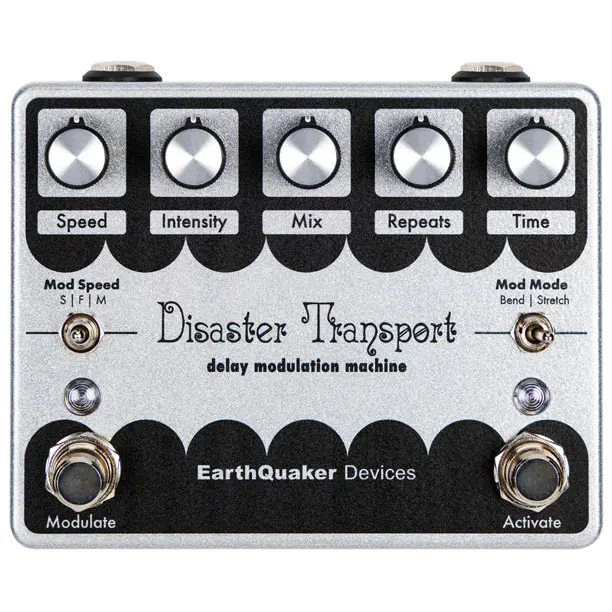
The EarthQuaker Devices Disaster Transport Legacy Reissue was supposed to be what its name states – a “reissue” of a pedal that started the delay + modulation trend back in 2019 – but it ended up becoming more than that, because, to quote the press release: “the OG of EQD, Jamie Stillman, couldn’t resist tinkering and improving the whole thing.”
There’s a clear difference in tone between this version of the pedal and the original, due to the fact that it was voice to sound like an analog delay pedal, not sparkling bright like the original, but warmer and darker.
The main upgrades included in this device are the Mod Mode Switch, which lets you bend or stretch the modulation wave, delivering classic chorus or pitch stretching modulation, and the Mod Speed switch, which works in conjunction with the Speed knob to give you three rates of modulation, from the insanely slow to incredibly fast and everything in between.
Here are the videos of it.
EarthQuaker Devices Disaster Transport Legacy Reissue, Builder’s Notes
Limited to 3,500 units worldwide. Behold! The newest incarnation of one of our most beloved pedals ever, the Disaster Transport. For those of you well versed in the pedal’s celebrated history, you might notice some differences on this beautifully sparkly box. A new Mod Mode switch allows you to bend or stretch the modulation wave. The new Mod Speed switch offers three rates of modulation, from bizarrely animated gradual climbs and steep drop offs to rapid chorus and intense vibrato.
The delay line has been redesigned to reduce the noise floor and improve the quality of the delay. Plus, it’s now filtered to sound more like an analog delay than any of the previous versions. With knobs to control the Speed, Intensity, Mix, Repeats, and Time; this analog-voiced digital delay sits perfectly in the background with an evolved ambiance, but can also be dialed in for the dramatic effect of your choosing.
We initially set out to recreate the original Disaster Transport pedal in its earliest form, but the OG of EQD, Jamie Stillman, couldn’t resist tinkering and improving the whole thing, so you just got upgraded, my friend. In doing so, we redesigned the delay line to reduce the noise floor and improve the quality of the delay. We boosted the output with a cleaner mixing section; it’s now filtered to sound more like an analog delay than any of the previous versions.
We’ve added a Mod Mode switch that allows you to choose between bending and stretching the modulation wave. The Bend setting offers a subtler vibe closer to a traditional chorus sound, while the new Stretch option gives you loads of pitch-stretching modulation to run wild with.
The other difference you probably spotted with your eagle eye is the Mod Speed three-position toggle switch. The Slow setting is excruciatingly slow and can produce bizarrely animated gradual climbs and steep drop offs. The Fast setting can go from a rapid chorus to an intense vibrato, while the Medium setting is the most traditional rate similar to the classic Memory Man circuit with a nice range to it.
The newly designed enclosure features knobs to control the Speed, Intensity, Mix, Repeats, and Time, with Modulate and Activate switches, making this a highly customizable pedal to get the delay sound of your dreams. Thanks to the ramp modulation circuitry, you can turn the delay time down and start to use feedback and modulation at a higher setting to harness a bizarre modulator and achieve subtle to wild chorus-type effects. Or set your delay time how you want to set it and use your modulation rates to set your tempo, so you can strum or pluck to the climbs and drop offs to match your riffs. The possibilities are endless.
Controls:
1. Speed: Controls the speed of the modulation. The Speed operates in three ranges (Slow/Fast/Medium) selected by the Mod Speed toggle switch. The Disaster Transport uses a Ramp wave for the modulation. You’ll find this to be much more intense than most modulated delays. Think of it as a traditional Triangle wave that falls off a cliff in mid-cycle, creating a drastic pitch bend in its wake. Or don’t and just think about whatever you want.
2. Intensity: Controls how much the LFO modulates the delay time. More subtle chorus type effects are achieved with less intensity and more intensity will yield wild pitch stretching and bending. The overall modulation style can be made more or less subtle by using the Mod Mode toggle switch to select Bend or Stretch.
3. Mix: Sets the volume level for the delay signal. Hear more of what you just played 30-600ms ago by turning this up.
4. Repeats: Controls the intensity of delay feedback from no repeats at zero to self-oscillation at max. Let the past pile up on you until it implodes.
5. Time: Sets the delay time from around 30ms at zero to 600ms at max. Everyone needs more time; all we can offer you is about 600ms worth.
6. Mod Speed: Three position toggle switch that sets the range in which the Speed operates.
7. Mod Mode: Two position toggle switch to choose the modulation style. Bend is more of a traditional chorus type modulation and Stretch is a wilder pitch stretching modulation.
8. Modulate: This foot-operated switch features Flexi-Switch® Technology and turns the modulation on and off.
9. Activate: This foot-operated switch features Flexi-Switch® Technology and turns the effect on and off.






















